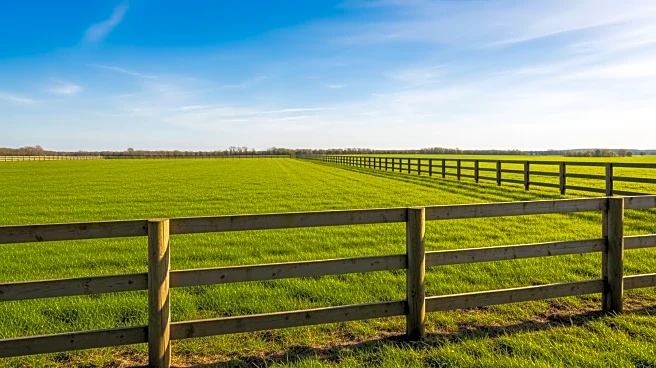What's Happening?
Despite challenges in commodity markets and uncertain farm profitability, agricultural land values have remained stable through mid-2025, according to Farmers National Company. This stability is attributed
to the basic economic principle of supply and demand, with more motivated buyers than willing sellers. Producers are the main buyers of agricultural land, but there is also significant interest from individual and institutional investors. The appeal of land as a long-term asset is reinforced by the increase in Midwest farmland values, which have risen 56.9% over the past five years and 38.3% over the past decade. Inventory remains limited, with listings down 20% to 25% from the peak in 2020-2021, as many long-term landowners choose to hold onto their properties.
Why It's Important?
The stability in agricultural land values is significant for both producers and investors, offering a reliable asset amid economic uncertainty. As the USDA forecasts 2025 net farm income to be the lowest since 2020, this could influence purchasing power and investor returns, especially with fluctuating input costs, commodity prices, and interest rates. Geopolitical developments, including trade policies and tariffs, also impact the market, creating uncertainty for U.S. agricultural exports. Those with solid financial positions will be best equipped to pursue land purchase opportunities, highlighting the importance of financial stability in navigating the current market.
What's Next?
Looking ahead, the agricultural land market will continue to be influenced by farm profitability and geopolitical developments. Farmers National Company anticipates strong demand for real estate and management services as landowners seek guidance in the volatile market. The company has successfully marketed over $450 million in land value in the first half of 2025 and plans to adapt to global elements impacting land value. As trade agreements are renegotiated, there may be future opportunities for U.S. agricultural exports, although current tariffs could decrease demand.
Beyond the Headlines
The agricultural land market's resilience highlights the broader economic implications of land as a stable investment. As geopolitical tensions and trade policies evolve, the market may experience shifts that could affect long-term land value appreciation. The role of institutional investors in the market underscores the growing interest in land as a strategic asset, potentially influencing future land use and agricultural practices.









